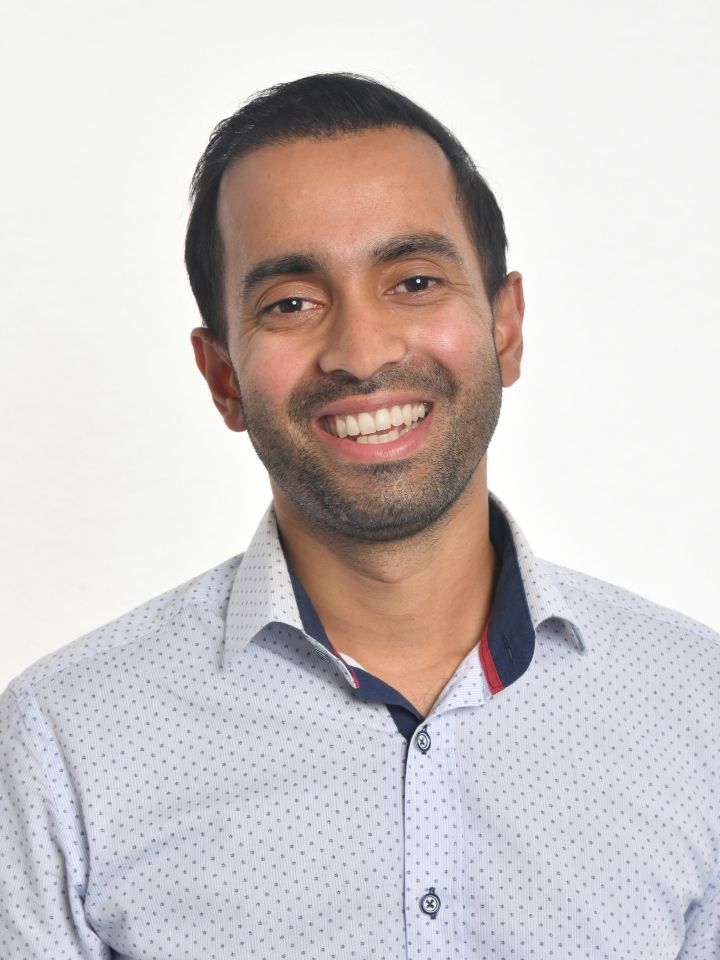Dr. Aviroop Biswas
Dr. Aviroop Biswas is a scientist at the Institute for Work & Health. He is also an assistant professor in epidemiology at the University of Toronto's Dalla Lana School of Public Health.
Biswas obtained his PhD in health services research at the University of Toronto’s Institute of Health Policy, Management and Evaluation. During his PhD studies, he received a doctoral research fellowship from the Toronto Rehabilitation Institute and was a past recipient of the University of Toronto’s Ted Goldberg award for academic excellence and promise in health services research. Biswas was previously a Mustard post-doctoral fellow at the Institute for Work & Health (2017-2019).
Biswas’s research at the Institute aspires to improve the sustainability of employment and the prevention of future worker injury and chronic disease by informing health promotion activities related to healthy physical activity and worker wellbeing. His recent research projects include examining how different workers’ daily activity profiles are associated with their risk of chronic disease, understanding how workplace wellbeing champions can support engagement and participation among their colleagues, and how different work arrangements (including telework) shape work-life balance and wellbeing. His studies have primarily involved the analysis of survey and administrative data, machine learning, as well as systematic reviews.

“Worker health goes beyond simply thinking about protecting workers from the hazards of work. Unhealthy living not only increases the risk of preventable disease, but is also a major cause of workplace absence and injury. The challenge is to convince employers that the health and well-being of workers is in the best interests of the workplace to promote.” – Dr. Avi Biswas
Projects
- Artificial intelligence and occupational injury and illness in Ontario: implications for prevention and recovery. Funded by Workplace Safety and Insurance Board. Ongoing.
- Champions as social agents of change: what can we learn from worker well-being initiatives?. Funded by Social Sciences and Humanities Research Council (SSHRC). Ongoing. (PI on the project)
- Evaluating the effectiveness of distance learning in delivering Ontario's JHSC certification training. Funded by Ontario Ministry of Labour, Training and Skills Development. Ongoing.
- Examining sex/gender differences in exposures to workplace-acquired communicable disease: a systematic review. Funded by WorkSafeBC. Ongoing. (PI on the project)
- Exploring how daily patterns of sleep and activity affect the risk of cardiovascular disease and mortality among Canadian workers . Funded by Canadian Institutes of Health Research . Ongoing. (PI on the project)
Publications
- Biswas A, Prince SA. Does remote work promote exercise and cardiovascular health? Current evidence and future directions. Canadian Journal of Cardiology. 2025;41(3):333-336. doi:10.1016/j.cjca.2024.09.029.
- Christopher G, Biswas A, Lang JJ, Prince SA. Occupational and sex differences in active commuting among Canadian workers from 2006 to 2016. Health Reports. 2024;35(9):3-15. doi:10.25318/82-003-x202400900001-eng.
- Shahidi FV, Liao Q, Landsman V, Mustard C, Robson LS, Biswas A, Smith PM. Precarious employment and the workplace transmission of COVID-19: evidence from workers' compensation claims in Ontario, Canada. Journal of Epidemiology & Community Health. 2024;78(11):675-681. doi:10.1136/jech-2024-222373.
- Biswas A, Tiong M, Irvin E, Zhai G, Sinkins M, Johnston H, Yassi A, Smith PM. Gender and sex differences in occupation-specific infectious diseases: a systematic review. Occupational and Environmental Medicine. 2024;81(8):425-432. doi:10.1136/oemed-2024-109451.
- Shahidi FV, Liao Q, Landsman V, Mustard C, Robson LS, Biswas A, Smith PM. Is precarious employment an occupational hazard? Evidence from Ontario, Canada. Occupational and Environmental Medicine. 2024;81(8):381-387. doi:10.1136/oemed-2024-109535.
Speaker Series presentations
- Engaging employees in wellness: Insights from workplace champions. IWH Speaker Series. October 21, 2025.
- How the physical and social environment shape commuters' choices to bike or walk. IWH Speaker Series. October 15, 2024.
- Is there an optimal daily movement pattern for heart health? A study of Canadian workers' activity tracker data. IWH Speaker Series. June 14, 2022.
- The health paradox of physically demanding work: What is it and should we be concerned?. IWH Speaker Series. May 11, 2021.
- Developing practical recommendations for integrating workplace safety and wellness initiatives. IWH Speaker Series. February 18, 2020.
Research summaries
- Mental health of Canadians who work from home no better or worse than those working outside the home. Research Highlights: Institute for Work & Health, October 2025.
- Which workers use active forms of transportation in their commutes?. Research Highlights: Institute for Work & Health, October 2024.
- Associations between physical activity patterns and cardiometabolic health in Canadian working adults. Research Highlights: Institute for Work & Health, June 2023.
- Workers doing vigorous, tiring activity all day no healthier than those who are least active. At Work article: Institute for Work & Health, June 2022.
- Review synthesizes differences between men, women in injury risks and outcomes. At Work article: Institute for Work & Health, May 2022.
Media coverage
- How employers can promote physical activity among workers: 3 messages based on research. The Conversation Canada. October 8, 2025. Available from: https://theconversation.com/how-employers-can-promote-physical-activity-among-workers-3-messages-based-on-research-259897
- The physical activity paradox. Rehab & Community Care. February 17, 2022. Available from: https://www.bluetoad.com/publication/?m=1929&i=731841&p=18&ver=html5
- How can workplaces help promote exercise?. The Weekend Morning Show with Dave Trafford. November 21, 2021. Available from: https://www.iheartradio.ca/newstalk-1010/shows/the-weekend-morning-show-with-dave-trafford-1.377616
- Workplaces can help promote exercise, but job conditions remain a major hurdle. The Conversation. November 15, 2021. Available from: https://theconversation.com/workplaces-can-help-promote-exercise-but-job-conditions-remain-a-major-hurdle-170921
- Sitting or standing too much at work? New video addresses ways to lower associated health risks. Safety + Health. December 27, 2018. Available from: https://www.safetyandhealthmagazine.com/articles/17906-sitting-or-standing-too-much-at-work-new-video-addresses-ways-to-lower-associated-health-risks